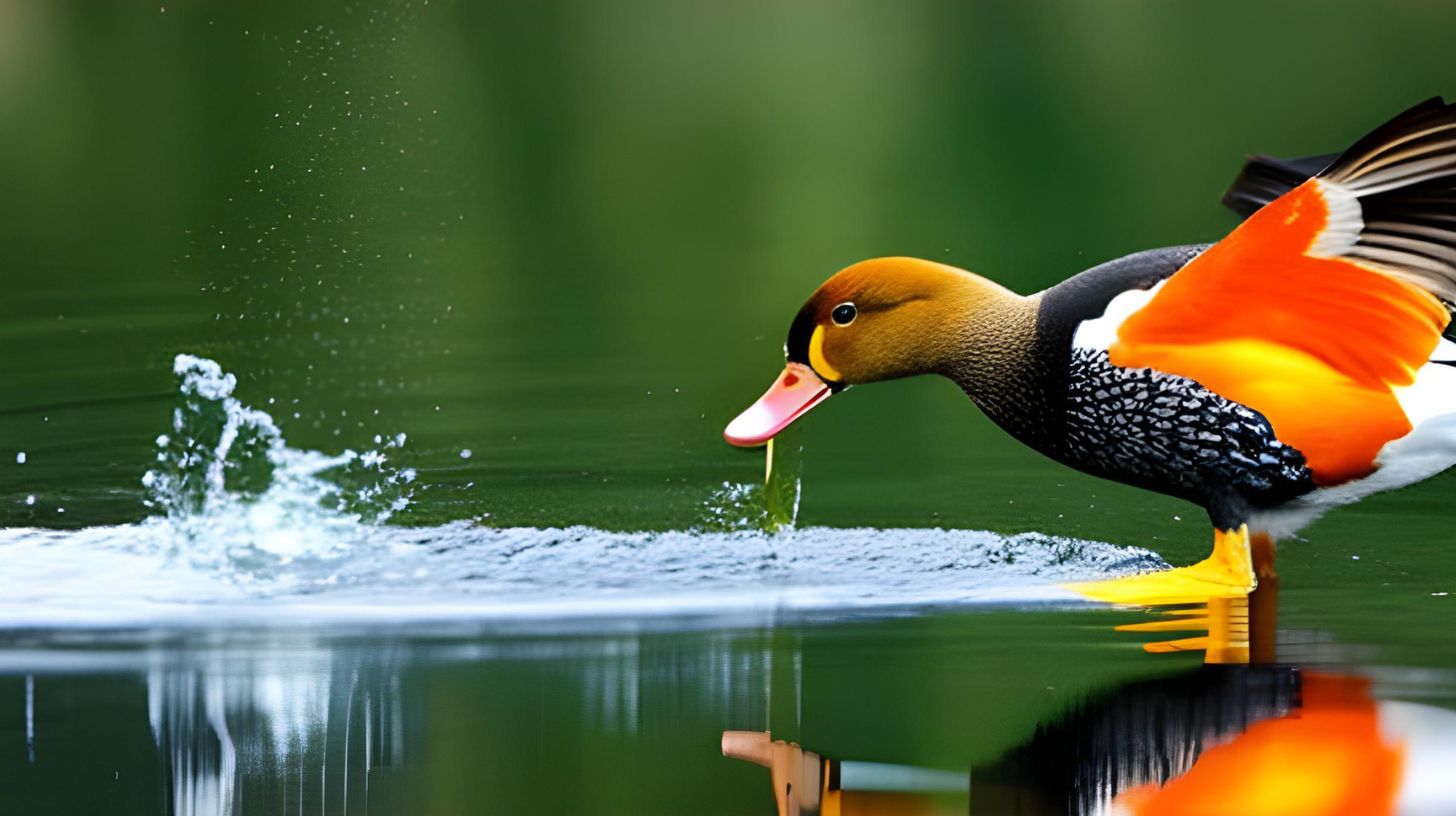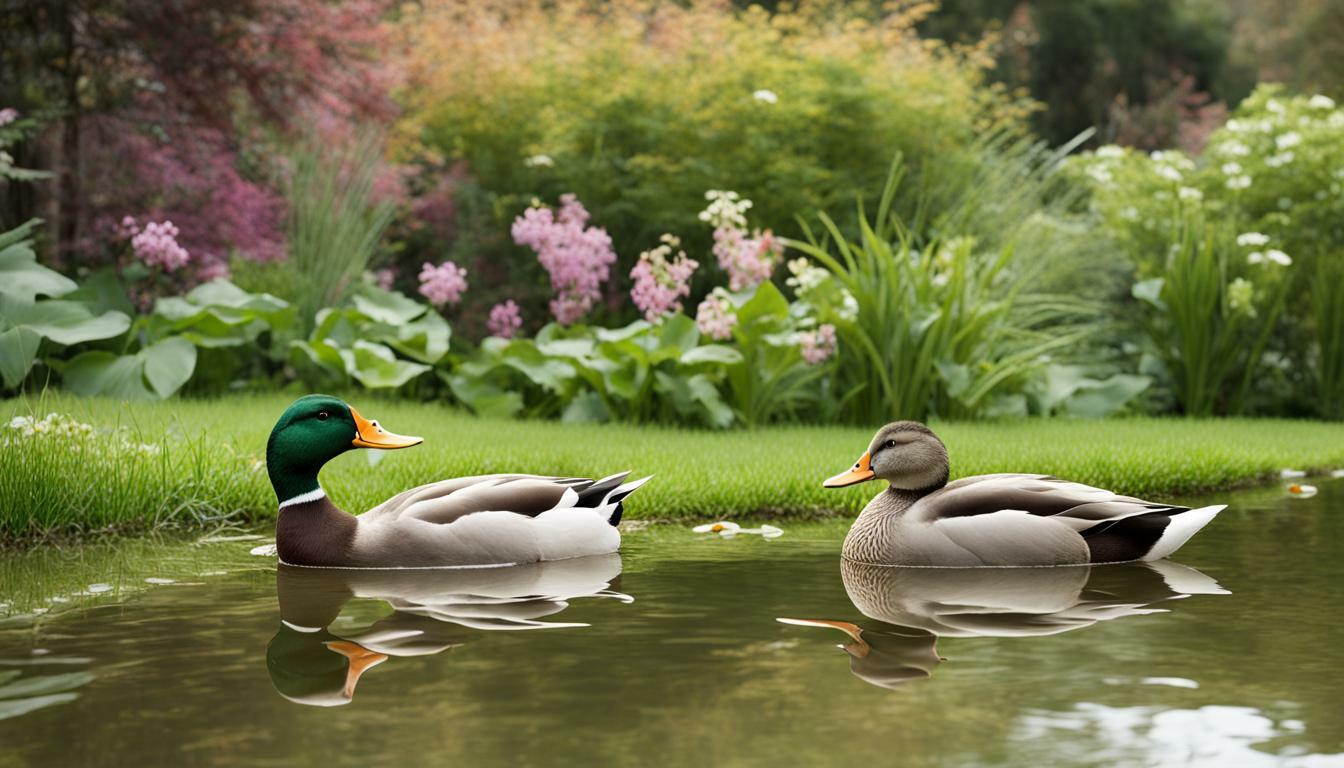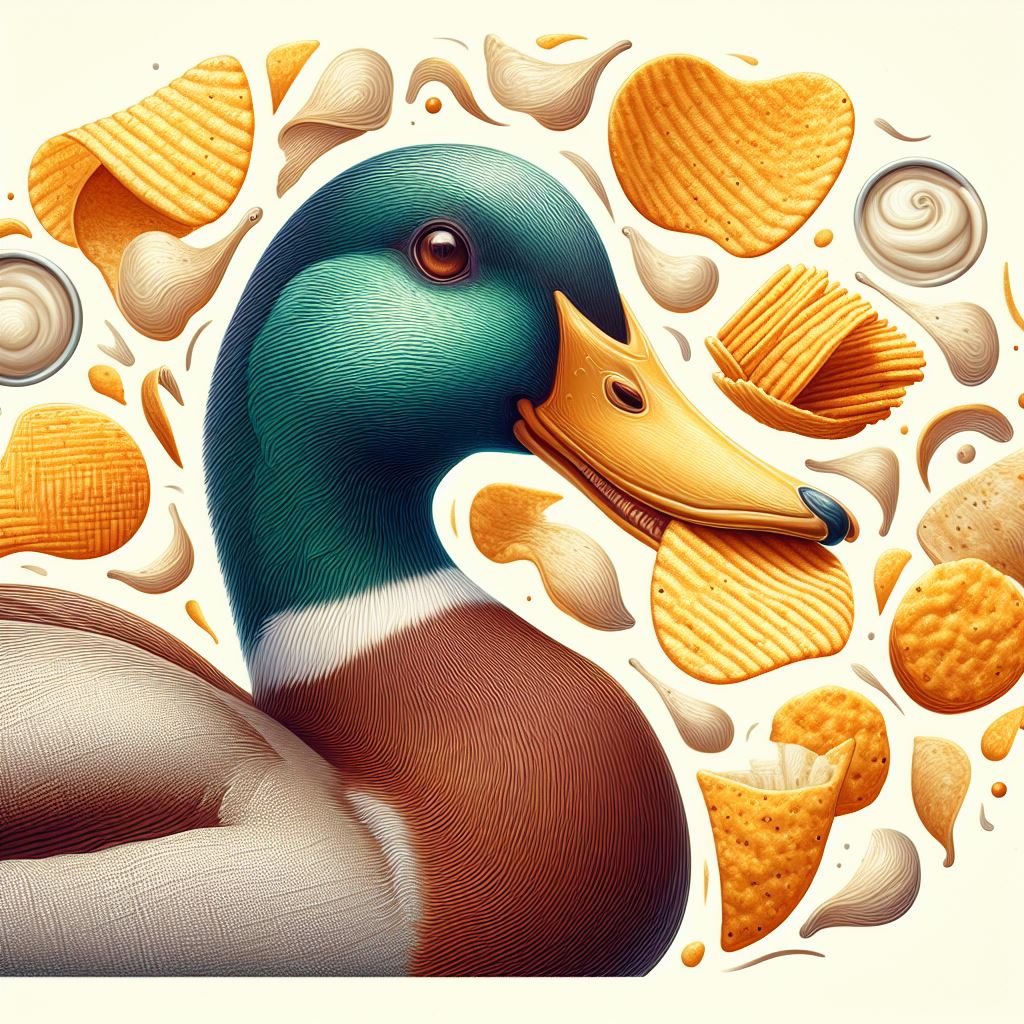Can Ducks Eat Cantaloupes? Fruit Safety Guide
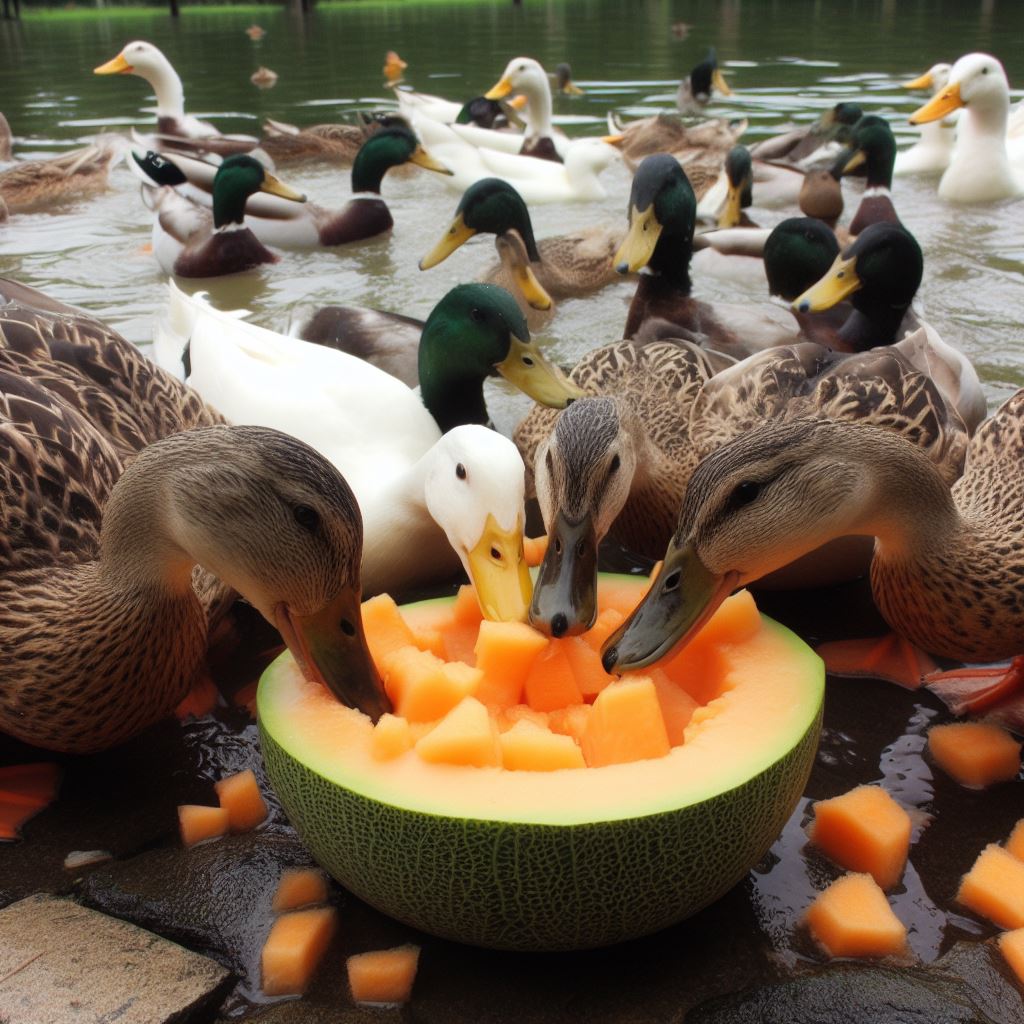
Table of content:
- An Overview of Ducks’ Diets
- Are Cantaloupes Safe for Ducks to Eat?
- Feeding Cantaloupe to Ducklings vs Adult Ducks
- Feeding Cantaloupe to Wild vs Domesticated Ducks
- Health Benefits of Cantaloupe for Ducks
- Potential Risks of Feeding Cantaloupe to Ducks
- Frequently Asked Questions about Feeding Cantaloupe to Ducks
- Conclusion
Cantaloupes are a popular summer fruit enjoyed by humans for their sweet flavor and high water content. But what about our feathered friends – can ducks eat cantaloupes too? Ducks can eat cantaloupe in moderation as an occasional treat. Cantaloupes provide vitamins, minerals, and water to ducks’ diets.
However, cantaloupe rinds and seeds should be avoided as they can cause digestive upset. Overall, cantaloupes make a healthy, natural snack for ducks if fed properly.
Key Takeaways:
- Ducks can eat small, sliced pieces of cantaloupe flesh in moderation.
- Cantaloupe rinds and seeds should not be fed to ducks as they are difficult to digest.
- Cantaloupes provide beneficial nutrients but should only be an occasional treat.
- Restrict portion sizes to avoid diarrhea or upset stomach from too much fruit sugar.
- Consult your veterinarian if you have questions about feeding cantaloupe to ducks.
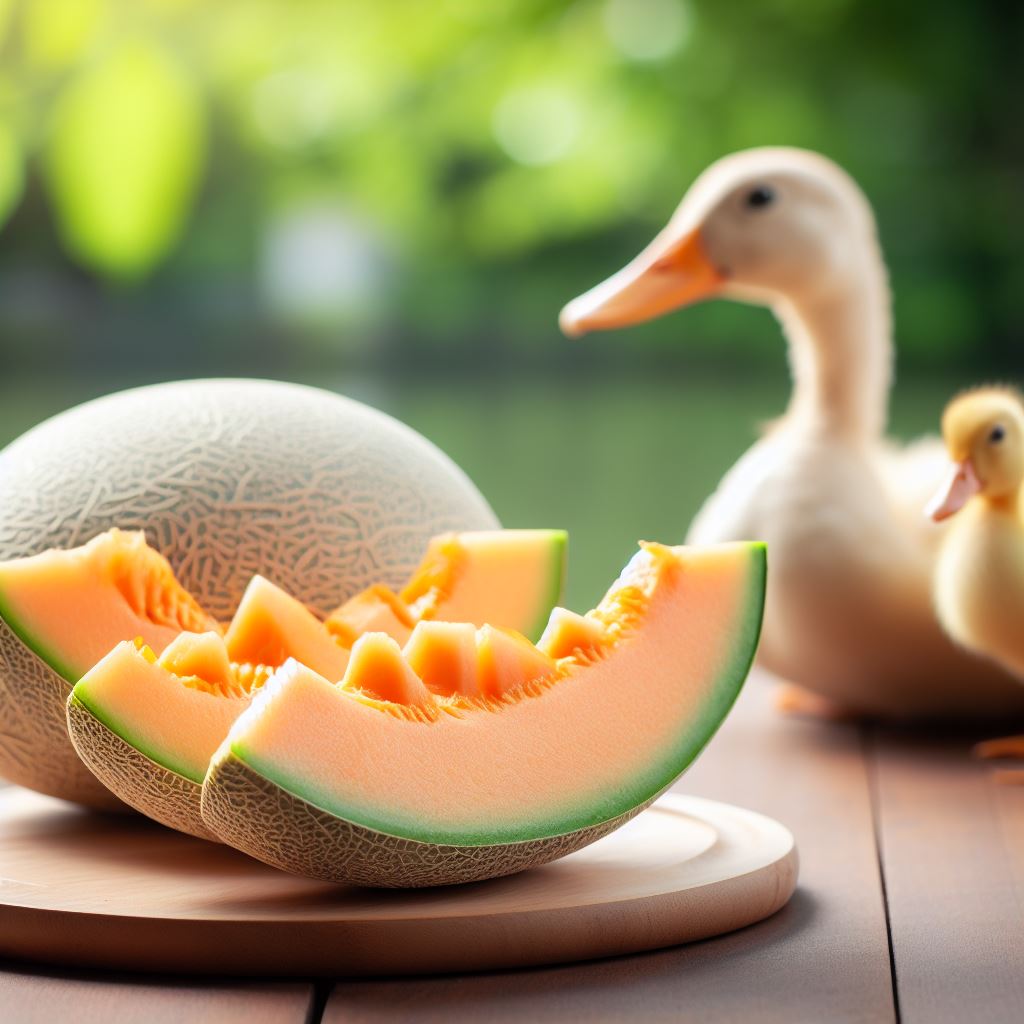 An Overview of Ducks’ Diets
An Overview of Ducks’ Diets
Ducks are omnivorous birds that thrive on a varied diet. Wild ducks feed on plants, seeds, insects, and small fish found in their wetland ecosystem. Domestic ducks also do well on diverse diets including formulated feed, fresh greens, vegetables, and occasional fruit.
Most ducks are opportunistic eaters. They forage for different foods based on seasonal availability. Their digestive system is designed to handle both plant and animal matter.
However, ducks lack teeth or a crop to help them grind and digest fibrous foods. So they do best with concentrated, pelleted feed along with tender greens, sprouted grains, and chopped produce. Ducks also need access to fresh water for drinking.
Are Cantaloupes Safe for Ducks to Eat?
Cantaloupes are non-toxic for ducks and provide beneficial nutrition. The sweet, orange flesh delivers vitamins A, C, and B complex as well as potassium and fiber. The high water content also helps hydrate ducks.
However, cantaloupe rinds are tough and fibrous. Eating the rind can cause intestinal blockages or upset stomach in ducks. Cantaloupe seeds are also difficult for ducks to break down. So it’s best to scoop out the seeds and only feed ducks the soft inner flesh.
In moderation, chopped cantaloupe can be a healthy snack for ducks of all ages. It adds variety to their diet and provides natural sources of nutrients. Just be mindful of portion sizes and avoid overfeeding to prevent diarrhea.
Nutrition Facts for Cantaloupes
| Nutrient | Per 100g | % Daily Value |
|---|---|---|
| Vitamin A | 3382 IU | 68% |
| Vitamin C | 36.7 mg | 61% |
| Potassium | 267 mg | 8% |
| Dietary Fiber | 0.9 g | 4% |
| Water Content | 90% | – |
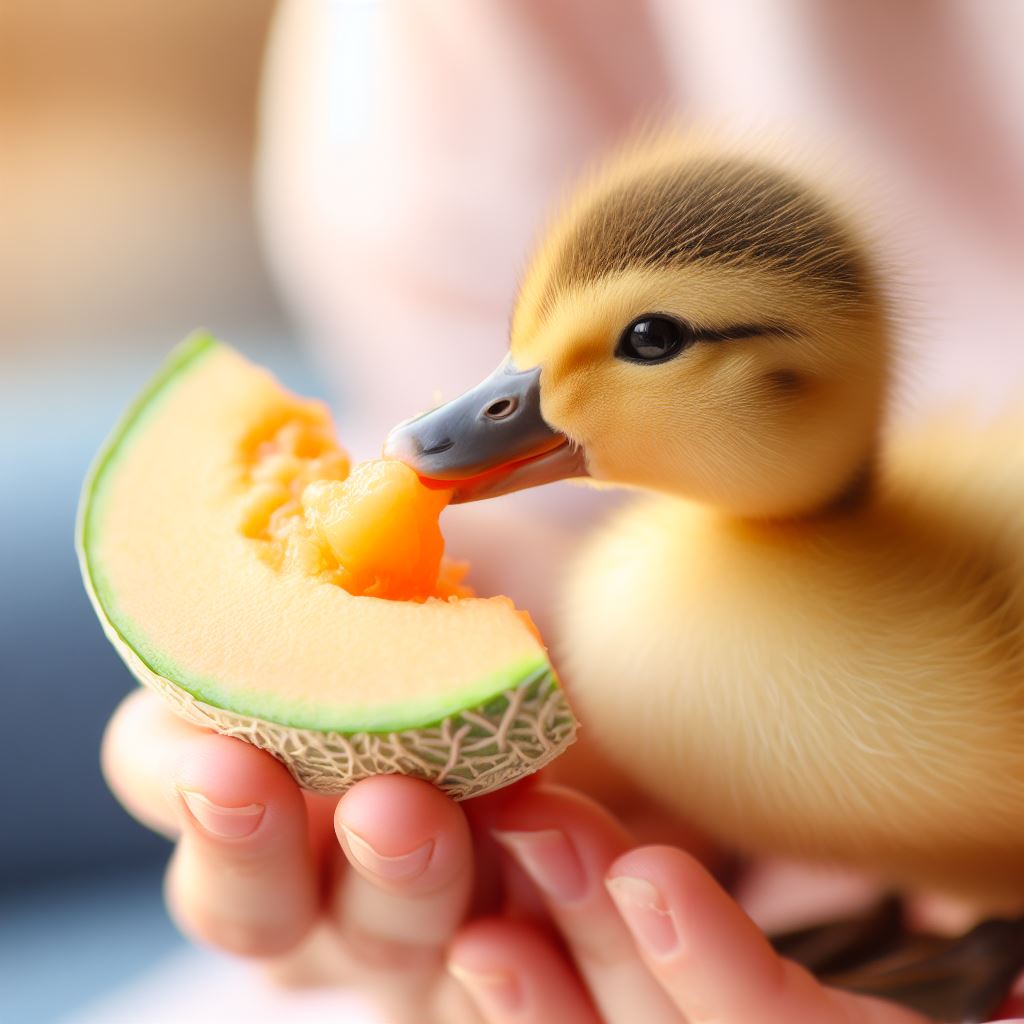 Feeding Cantaloupe to Ducklings vs Adult Ducks
Feeding Cantaloupe to Ducklings vs Adult Ducks
Cantaloupe can be fed to ducks of all life stages as part of a balanced diet. However, ducklings under 4 weeks old have different nutritional needs than mature ducks. Here are some tips for feeding cantaloupe safely to ducks by age:
Ducklings Under 4 Weeks:
- Only provide small slivers of soft, ripe cantaloupe flesh. Avoid rind and seeds.
- Restrict treats to once or twice a week after ducklings are 2 weeks old.
- Prioritize proper duckling starter feed and extra protein from crumbled hard-boiled eggs.
Adult Ducks:
- Chop cantaloupe into bite-size pieces removing rind and seeds first.
- Feed cantaloupe as an occasional treat 2-3 times per week.
- Limit portion sizes to 1-2 tablespoon pieces per duck.
- Maintain pelleted duck feed as the dietary staple along with fresh greens.
For young ducklings, commercial starter feeds are crucial to provide complete nutrition for growth and development. Cantaloupe should only supplement a healthy core diet.
Consult your veterinarian if you have questions about the ideal diet for ducks at different life stages. Pay attention to their growth, energy levels, and droppings to ensure their diet stays balanced.
Feeding Cantaloupe to Wild vs Domesticated Ducks
Both wild and domesticated ducks can eat cantaloupe in moderation. However, the methods for offering cantaloupe will differ based on the environment:
For Wild Ducks:
- Chop cantaloupe flesh into small pieces and scatter in natural ponds or wetlands.
- Avoid overfeeding to prevent food waste and water contamination.
- Remove rinds so wild ducks do not mistakenly try to ingest them.
- Only supplement cantaloupe occasionally, relying on the ducks’ natural foraging diet.
For Domestic Ducks:
- Offer chopped cantaloupe in a dish or feeder inside an enclosure.
- Hand feeding cantaloupe allows monitoring of portion sizes.
- Make cantaloupe an occasional treat, not a dietary staple.
- Take uneaten cantaloupe out of the enclosure promptly to avoid spoilage.
Feeding Guide for Cantaloupe with Wild vs Domesticated Ducks
| Type of Duck | Feeding Method | Frequency | Portion Size |
|---|---|---|---|
| Wild Ducks | Chopped pieces scattered in ponds | Occasionally | Sparingly |
| Domestic Ducks | Chopped pieces in dish/feeder | 2-3 times per week | 1-2 tbsp per duck |
For domesticated pet ducks, you have more control over their diet and feeding schedule. Take care not to overfeed fruit, which can lead to loose droppings or diarrhea. Aim for moderation and variety in treats.
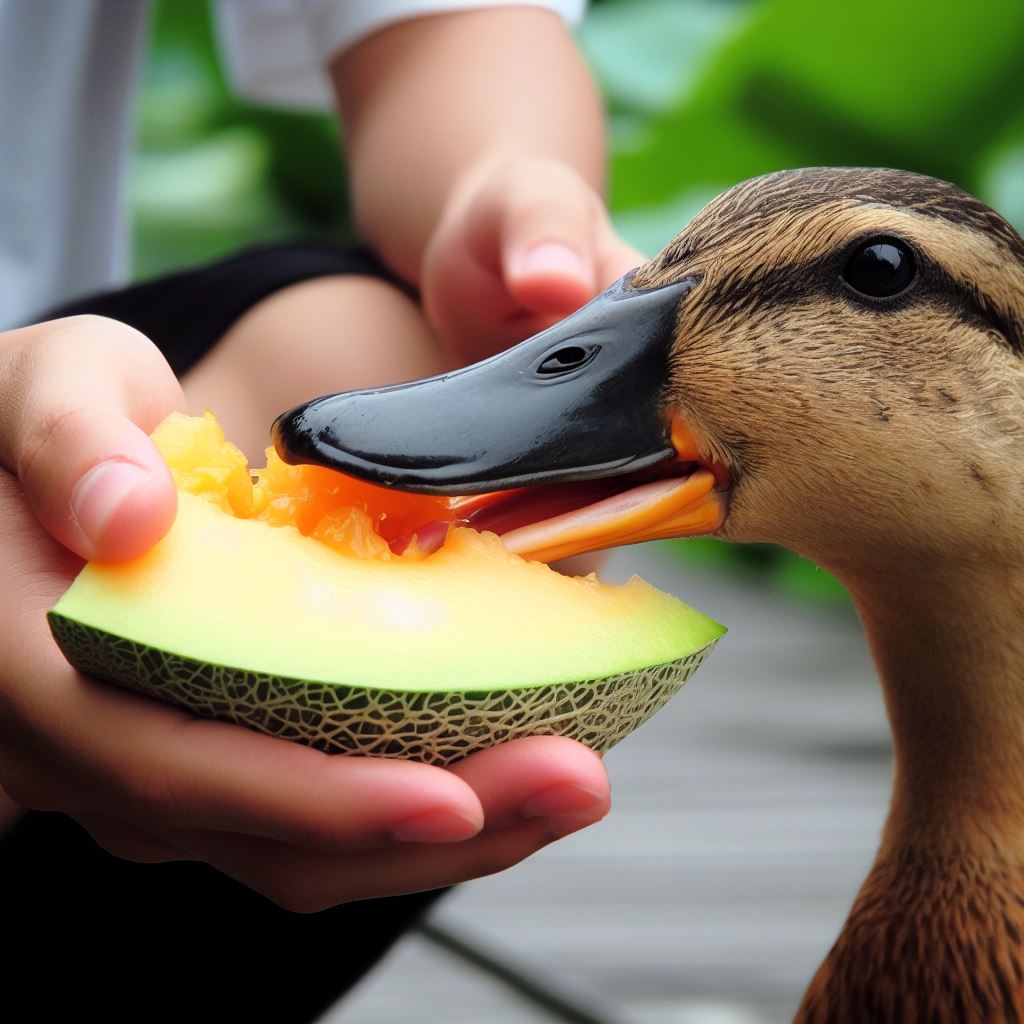 Health Benefits of Cantaloupe for Ducks
Health Benefits of Cantaloupe for Ducks
When fed properly, cantaloupe can be a nutritious supplement for ducks. Here are some of the key health benefits:
- Hydration – Cantaloupe is 90% water, providing needed moisture in ducks’ diets. This helps counterbalance dry feed and prevents dehydration.
- Vitamin A – Cantaloupe contains high levels of provitamin A carotenoids which ducks convert into essential vitamin A for immune function and vision.
- Potassium – Cantaloupe delivers potassium, an electrolyte mineral for fluid balance, nervous system function, and waste elimination.
- Fiber – Cantaloupe provides both soluble and insoluble fiber to support digestive health and gut motility in ducks.
- Antioxidants – Cantaloupe is high in vitamin C and carotenoids with antioxidant properties to neutralize free radicals.
Along with these benefits, cantaloupe adds variety and natural sugars that make it an enticing, palatable treat for ducks. The nutrients and hydration cantaloupe support overall duck health.
Potential Risks of Feeding Cantaloupe to Ducks
Cantaloupe makes a healthy snack for ducks if fed properly. However, there are some potential risks to be aware of:
- Choking hazard – Large chunks could present a choking risk, especially for young ducklings. Always dice cantaloupe into small pieces.
- Diarrhea or upset stomach – Excess fruit sugar and fiber may cause loose droppings if overfed. Stick to small portions.
- Dehydration – High water content of cantaloupe may lead to watery diarrhea. Ensure ducks have adequate fresh water.
- Rind blockages – Swallowing rinds can obstruct ducks’ digestive tracts. Be sure to remove rinds before feeding.
- Unbalanced nutrition – Too much cantaloupe may displace formulated duck feed needed to provide complete nutrition.
By feeding cantaloupe in moderation and properly preparing it, you can avoid these risks and provide ducks with a healthy, natural treat. Good husbandry practices are key to keeping ducks healthy on any supplemental foods.
Frequently Asked Questions about Feeding Cantaloupe to Ducks
Can baby ducks eat cantaloupe?
Yes, ducklings can eat small portions of chopped cantaloupe starting at 2-4 weeks old. Avoid rind and seeds, and stick to a few slivers 1-2 times per week with proper duckling starter feed.
How much cantaloupe should you feed a duck?
For adult ducks, limit cantaloupe to 1-2 tablespoon sized pieces per duck, 2-3 times per week. Adjust portions based on their overall diet.
Is it safe for ducks to eat cantaloupe rind?
No, ducks cannot properly digest tough cantaloupe rinds. Remove all rinds and seeds before feeding cantaloupe to ducks to avoid intestinal blockages.
Can you feed cantaloupe to ducks daily?
Cantaloupe should only be fed occasionally as a treat. Daily cantaloupe feeding can lead to excess sugar, diarrhea, and nutritional imbalance. Stick to 2-3 times a week.
Do wild ducks eat cantaloupe?
Wild ducks will sample cantaloupe along with other fruits if available in their wetland ecosystem. But the bulk of their diet consists of aquatic plants, grasses, seeds, and insects naturally found in their habitat.
What other fruits can ducks eat?
In addition to cantaloupe, ducks can eat small portions of chopped apples, grapes, berries, bananas, mangoes, and other melons like watermelon and honeydew.
Conclusion
Cantaloupe can be a healthy, natural snack for ducks when fed properly. The nutrients, vitamins, minerals, and high water content provide benefits to ducks’ health. However, cantaloupe should only be fed in moderation to avoid overfeeding.
Chop cantaloupes into small pieces, removing rinds and seeds, to make them duck-friendly. Overall, the occasional cantaloupe treat adds diversity to ducks’ diets and provides them with a sweet, hydrating snack they enjoy. With proper portion control, cantaloupe is a safe fruit to use as a supplemental feeding for ducks.
Welcome. I’m Adreena Shanum, the proud owner of this website, and I am incredibly passionate about animals, especially poultry. I founded adreenapets.com as a labor of love, stemming from my desire to share my knowledge and experiences with poultry enthusiasts worldwide.


